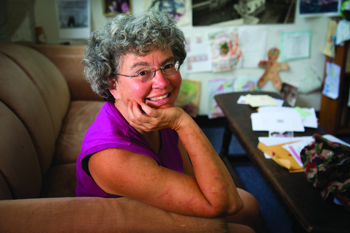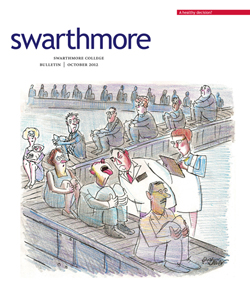A Delicate Balance (Video)
Storyteller and linguistics professor Donna Jo Napoli masters disparate disciplines

A professor at Swarthmore since 1987, Donna Jo Napoli, among many other things, advocates in medical journals for change in the way parents of newly deaf children and deaf newborns are advised by physicians. Photo by Laurence Kesterson
Donna Jo Napoli leads a double life: as a college professor and an author of children’s fiction. Typically, her identities never intersect, but this summer, Napoli found them in perfect harmony when she was extended an invitation to Trinity College Dublin as a Long Room Hub Fellow. The fellowship is humanities based, and an invitation to visit must come from two separate units within the humanities at Trinity. Although linguistics is classified as a social science at that college, Napoli was brought in by Trinity’s Center for Deaf Studies (thanks to her work with deaf individuals) and the School of English.
A prolific writer, she’s published more than 70 books, including Stones in Water, Albert and Daughter of Venice, all books for children through young adults. Napoli is well known on campus for her regular attendance as a student in cross-disciplinary classes ranging from math to modern dance, her bright-colored stockings, and for signing her campus correspondences with “Love, Donna Jo.” Upon finishing her latest book this summer, a companion volume to Hush: An Irish Princess Tale, Napoli sent an email to the campus community seeking the insights of children for her next novel, as is her custom. In March, the mother of five and grandmother of two delivered a speech at TEDxSwarthmore on why children need to read stories about terrible things. (Watch her talk at bit.ly/TedxTalk).
This summer, Napoli made time to sit down with Bulletin writer Carrie Compton, to discuss some of the finer and more frustrating points of her double life.
Talk about your time at Trinity over the summer—what you were able to do there?
It’s the first time I’ve ever gone anywhere where I’ve been treated like a whole person, because when I’m here at Swarthmore, I am a linguist—that’s who I am, that’s what I teach, I don’t ever do anything else. When I’m elsewhere in the world, I’m either a linguist or a writer. I write stories for children, and I go all over the place, giving lectures and teaching summer courses. At Trinity, I worked closely with people on deaf studies, on issues of literacy and language rights for deaf children, and I visited the school for the deaf and worked with parent organizations, parents of deaf newborns or newly deafened small children. I also worked with three professors on a theoretical linguistics paper that involves Irish sign language—a semantics paper, so it’s theoretical linguistics, but it’s connected with sign language. And I wrote a novel. I was very busy, and it was fantastic.
Do you struggle with the balance of being a linguistics professor and a writer, or do you find it to be perfectly divided?
Oh, it’s not perfectly divided; I go through different periods. I went through a period of many years when my writing mattered to me much more than my linguistics. But then I became involved in deaf issues and for the past decade I’ve spent far more time on linguistics than on writing. When I do research on deaf issues, there are potentially many people who might be affected—and that’s very gratifying. See, the thing about linguistics is, it’s a wonderful field. I’m completely fascinated by it, but it’s a very theoretical field, and when you write a paper, maybe there are 100 other people in the world who care about what you wrote. And sometimes you can write something that appeals to more people en masse, so maybe, 5,000 people will read it. It’s a tiny little thing that you’re doing, and that’s how academia is often. You’re all these little cogs in the wheel, and every cog is needed, and I understand that, but when you write a novel you get lots of mail from kids like, “When my parents got divorced, I thought I couldn’t make it without your book.” It sounds ridiculous, but it makes you feel like you matter. You’re touching lives, and lots of lives. You sell 100,000 books—that’s a lot of people. And if it’s in a library, you don’t know how many people are checking it out.
What do you struggle with most as a writer?
Two things: one is finding the time to write all of the things that I want to write. Kids will say to me, ‘Where do you get your ideas from?’ And I understand it when a kid asks me, because kids sit in a classroom, and the teacher says, ‘OK, tonight go home and write a poem about whatever,’ or ‘You have to write a short story this week.’ They’re told they have to do it. But whenever adults ask me, ‘Where do you get your ideas from?’ I want to say, ‘What do you think this is all about?’ It’s not like somebody’s told me I have to write. I desperately have things I want to tell people, and so I’m never at a loss for what to write a story about. The question is just which story am I going to write now? And when do I find the time to write?
The other hard thing is second drafts. I love first drafts. First drafts go very quickly for me. I do a lot of research, because I’m usually setting my story in some other time and place, so I have to learn a lot—that’s a lot of fun. I write my first draft kind of quickly, and I just let things happen, follow it wherever it goes, and I’ll have a terrible first draft, but there it is, and I can make it better.
The second draft is where a lot of that hard work comes in. There’s a difference between being a writer writing for yourself and being a writer writing for yourself and strangers. If you want to write for strangers, then you have to edit, as well as write, and second drafts require very intellectual forming, shaping. You have a character that you love, but that character doesn’t make the story go forward—in a children’s book, you have to get rid of that character. In an adult book, maybe you can indulge yourself, because adult readers, they’re not learning about the aesthetics of a book. But for a child, you’re teaching about the aesthetics of a book, and you have no right putting in anything extraneous. Your story should be very, very tight.
Lots of writers talk about the difficulty involved in making bad things happen to their protagonists or the characters that they love. Is that a struggle for you as well?
No, it’s not. I love misery, and I love writing about misery, and lots of times misery will be the foundation for a character’s growth in one of my stories. So I have very dreadful things happen to my characters, and it’s not a problem for me at all. Sometimes people feel that that’s inappropriate in children’s books, but I don’t.
There’s a scholar of fairy tales at Harvard, Maria Tatar; she’s just a lovely, terrific woman. She and I have been on many panels together, and she’s still angry at me for having the main character in one of my books die. The character dies in the last line of the book. She just feels that in a children’s book that’s not kosher, and I think it is.
You recently gave a speech at TEDxSwarthmore discussing the value of children being exposed to terrible things through literature. Could you recap your argument?
When you read about something dreadful and the character is coping with it—you learn some things. You learn that lots of people are coping with things, and you learn some coping strategies. If you’re a person who has a lot of difficulties in your life—even if the character in that book doesn’t have the same difficulties—just seeing that character deal with adversity can keep you from feeling sorry for yourself, can make you understand that there might be lots of other people around you who are having problems, but they’re just keeping silent.
If it can show you one way that this character has dealt with a problem, maybe it will help you to find a way to deal with your world, and if you’re not having problems in your life, if you’re a relatively pampered person, it’s really good for you to see that not everybody is and to develop empathy for other people. Chances are you’re not going to be pampered always. Most of us don’t lead charmed lives—most of us have to cope at different points. So that’s my argument. It’s good for you to read about terrible things.
 Email This Page
Email This Page